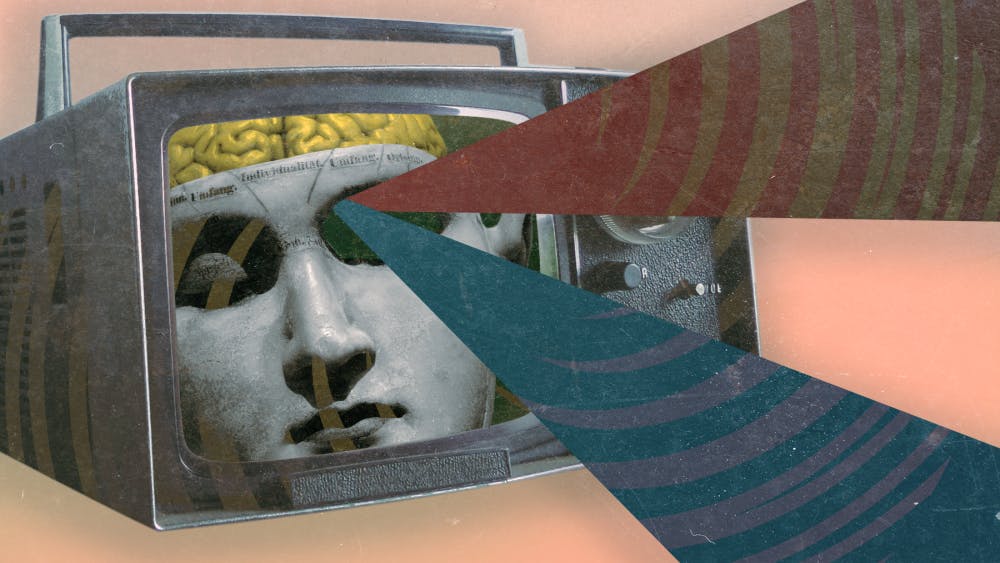This review contains spoilers
Netflix’s “You” is an exceptional dark thriller that captured its viewers’ hearts in its first two seasons. The psychological series garnered great ratings because of its ability to make the audience side with, and even fall for, a sociopathic serial killer. Season three is no different. The plot and character development continue to challenge our moral convictions. It is not easy to sow doubt in the viewers’ minds with a murder drama, but “You” pulls this off with a combination of a charismatic lead, a dose of social commentary and lots of voice-over narration.
The first season introduces us to Joe (Penn Badgley), who at face value, is the average nice guy who works at the bookstore. However, this image quickly dissolves as Joe starts to stalk a customer named Beck (Elizabeth Lail). Joe is truly under the impression that he is the only one who is capable of protecting her, leading him to commit heinous acts in the name of love. Once Beck catches on to his obsession, Joe kills her. Season two brings us to Los Angeles, where Joe seeks a fresh start. There, he falls in love with a woman named Love Quinn (Victoria Pedretti) and follows her around just as he did Beck. Right as Joe is about to kill Love, she reveals to him that she is pregnant.
Season three of “You” brings us to the town of Madre Linda, a liberal, upper-class mecca full of tacky athleisure, keto diets and lifestyle blogs. Joe and Love Quinn-Goldberg are tasked with blending in to escape their murder-filled past. Joe’s twisted but somewhat relatable internal dialogue is our tour guide as he navigates this suburban utopia.
Season three introduces a fresh challenge as the newlyweds have a go at parenthood. Joe and Love get acclimated to their new community as the new family on the block. That is, until Joe falls for his wealthy neighbor, Natalie. In true Joe nature, an obsession forms, and he resorts to breaking and entering, theft and textbook stalking. The cycle continues. Unlike the previous seasons, however, Joe now has a wife who is as crazy as him. To say that this couple is toxic is an understatement. The juxtaposition of murder sprees to the white-picket lifestyle requires us to constantly remind ourselves that these people are serial killers. The third season is a back-and-forth of Love and Joe’s internal battles with their pasts and present desires as they struggle to embody the image of a perfect family. Both Love and Joe are stuck in an endless cycle of trying to convince themselves that they are a perfectly normal family, and it is the world around them that is wicked. Moments like bringing their child along to bury a dead body and fighting over whether it would scar the child are ironically funny. Joe and Love are certainly troubled, but “You” offers something deeper than the shock value of next-door murderers. Instead, Joe and Love are funhouse mirrors that, at their core, are a reflection of us in an extreme, twisted, exaggerated way. We are so convinced that our desires are puzzle pieces to internal peace and external acceptance. Joe wants to love and be cared for, and we root for him because it is something that we all want. Joe is a master architect of delusion and manipulation, and that is why we end up empathizing with him. He is the perfect antihero.
To my own shock, I found myself villainizing the townspeople of Madre Linda, but I did appreciate the subtle social commentary sprinkled throughout the season. The show touches on issues surrounding anti-vaxxers, missing white woman syndrome and addiction. Did I agree with Love’s decision to knock out an anti-vaxxer with a bat? No. But did I feel bad for him? No. The show engages viewers in a dark way that allows them to live out fantasies that would not be accepted in the real world. Joe tortures a father who both conceals his son’s sex crimes and later bribes Ivy League admission officers. The world rarely prosecutes people of that class, and the show gives us a fictional but cathartic form of justice. Also, the show points out and mocks the many shams of influencer culture. From preaching for environmental awareness but driving Jeep Wranglers to advocating for body positivity but outcasting everyone over a size two, this show calls out the hypocrisy that makes the people of the town seem more delusional than Love and Joe.
Badgley’s amazing performance is the backbone of the show. The twisted charisma (and not to mention, attractiveness) that he brings to his role is what makes this show so compelling. Only Badgley could make us feel so charmed by a murderer who chops up their victims’ bodies in a bakery and frames innocent people for the crime. As long as Badgley remains on the show, viewers will continue to watch murder after murder.





